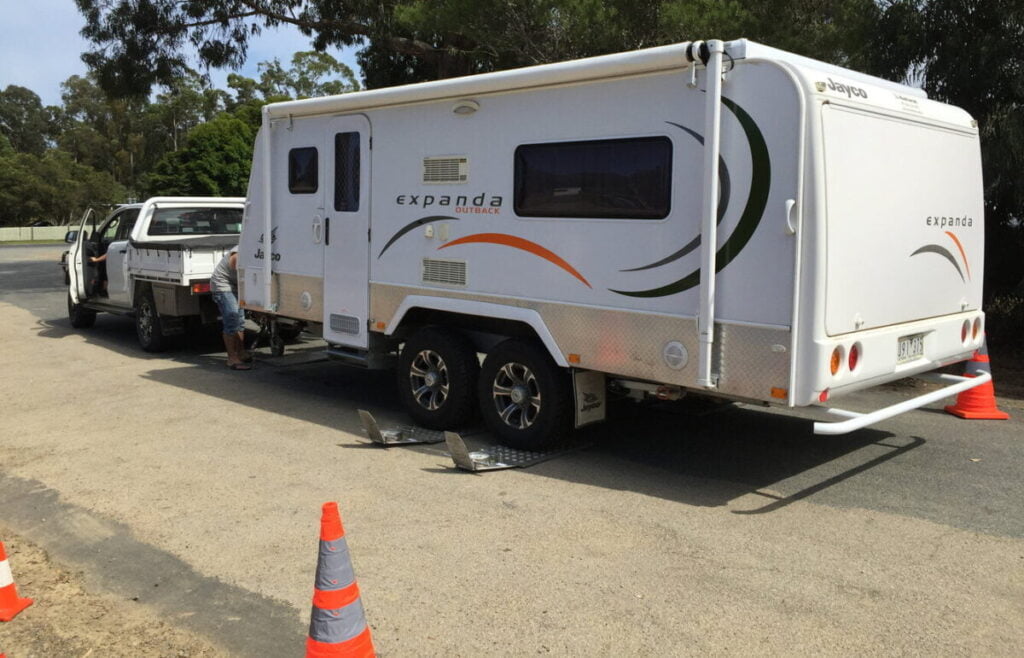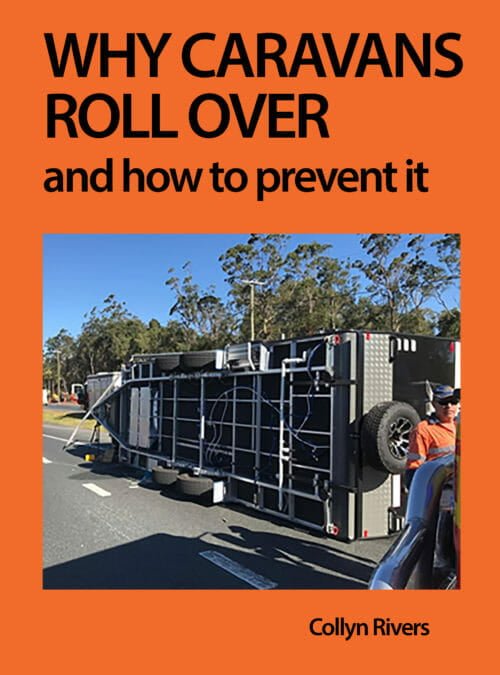by Collyn Rivers
An interview with Sergeant Graeme Shenton
Overweight RVs – a police point of view is a précis of my discussion with Sergeant Graeme Shenton about a major roadside check of the extent of overladen RVs. Most rigs checked were caravans.
RV Books: Do RV owners see overloading as a safety issue?
Sgt. Shenton: Caravan owners appear to accept overweight caravans are a risk. They also accept that police should actively check offenders.
RV Books: Is there not a further problem that vehicles used to tow caravans are far too light? They have increasing power, but lighter construction?
Overweight RVs – a police point of view –caravans too heavy
Sgt. Shenton: Caravans have become larger. Many 3.5 tonnes or more. The vehicles used to tow them are too light to tow such weight. In my opinion, the ‘tail wagging the dog’ effect contributes to caravan instability. It causes crashes and roll-overs.
RV Books: Do you have any data about the number of accidents resulting in caravan rollovers?
Sgt. Shenton: Of ‘rollovers’ alone, one insurer (that has 30% of the market) advises it has had well over 100 claims a year during the past 4.5 years. If ‘loss of control’ accidents is included, it’s multiple thousands.
RV Books: When did you start publicising details of weighing – was there any negative reaction?
Sgt. Shenton: The concept of what became overweight RVs – a police point of view was in May 2016 and related to rigs being checked at the Cann River weighbridge. There were no negative reactions. Photographs taken there [by Martin Ledwich] were viewed many thousands of times for months thereafter. It was very gratifying as it focused attention on safety issues.
Overweight RVs – a police point of view – overweight issues
RV Books: I recollect your later check (January 2017 in East Gippsland) resulted in some surprises. This because many of those attending had been invited. They knew their rigs would be weighed.
Sgt. Shenton: Indeed! It surprised us too! We had made it widely known that our check was being made. Also that its aim was to gather information. We weighed 71 rigs. Of those, 41 were overweight in one (or more ratings). A surprise was that most owners had some idea of their legally maximum weight. Only three, however, knew what their rigs actually weighed. Only two knew all the applicable ratings.
RV Books: For overweight RVs – a police point of view – were many seriously overweight?
Sgt. Shenton: Five (caravans) were overweight by more than 20%.
Overweight RVs – a police point of view – owner reactions
RV Books: What reaction did you receive when owners were made aware of their caravan and tow ball weight?
Sgt. Shenton: Surprise at the actual weight. Also that they had so substantially underestimated it.
RV Books: Again for overweight RVs – a police point of view did you also check the tow vehicles?
Sgt Shenton. No, it was felt better to weigh as many caravans as possible. It was clearly obvious, though, that many of the tow vehicles too were overladen. We advised owners of how to reduce that weight. We also advised of the [adverse] effects of weight, and its distribution, on stability.
RV Books: The results seem to indicate that many RV owners have no idea what their rig weighs!
Sgt. Shenton: It certainly showed their knowledge of weights and (legal) ratings to be minimal. Also that this lack of knowledge, and its safety implications, requires further attention. It is of major concern that most drivers have little idea of what their rigs actually weigh.
There’s also a problem, primarily with caravans. The Compliance plate does not always show the true Tare weight. That can lead owners into loading their RVs beyond the legal maximum.
RV Books: To what extent do you feel that such overloading is causing RVs to be unsafe?
Sgt. Shenton: It is difficult to quantify. It seems logical exceeding permitted limits will increase the possibility of having an accident. It will also increase its severity.
Owner reactions
RV Books: Did you experience any hostility to Overweight RVs – a police point of view operations?
Sgt Shenton: Next to none. RV owners seemed keen to know about matters vital to safe usage. Not just for themselves but to pass on to others.
RV Books: We believe tow courses for new caravan buyers towing drivers should be obligatory. Do you have any views about this?
Sgt. Shenton: Yes, very much so. Such courses are commercially available. They are supported by the Australian Government. Furthermore, it is a nationally recognised qualification.
RV Books: Any further recommendations for our readers?
Sgt. Shenton: I feel that education is more important than enforcement. I’d like to see more use of transport authority weighbridges – but many are closed much of the year. Also, that driver education is encouraged by caravan dealers.
Also important is that RV vendors stop declaring incorrect Tare Mass on compliance plates.
RV Books: Thank you very much for making this invaluable information available. It is greatly appreciated.
NOTE
Sergeant Shenton was an Acting Sergeant when the original inspections were conducted. He was subsequently promoted. His work is being extended to other states and jurisdictions. They have generally similar results.





